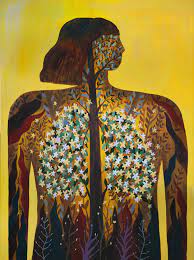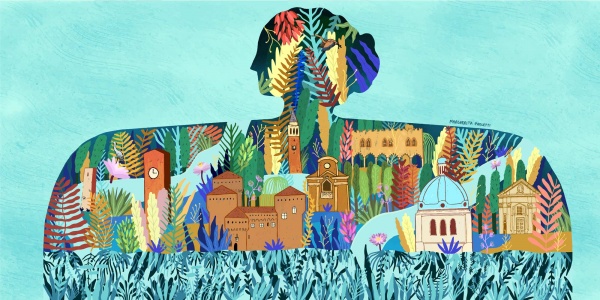Topic: Respiratory System
Abstract:
Students will imitate the process of how breathing happens
Learning objectives:
– Student being able to learn how breathing works
– Students will learn which organs is involved in the respiratory process.
Teachers’ profile: (team transversality)Science teacher
Advisable age of students:(Flexible according to the curriculum of specific country) : 12-14 years old
Previous knowledge:
General functioning of the human body. Names of the organs.
Materials: Paper – Pencils
Phase 1 Duration: 10- 15 minutes Visualisation
Development :
Discussion around the artist:
Who?
What did he do?
Lead students to describe the painting presented. Then, link this painting with how breathing works. Why do you think there are flowers in the lungs of the lady?
Do you know what happens to the air that gets into our body?

Phase 2 Duration: 25 minutes Artistic action and experimentation
Development:
Create small pieces of paper with the names of the organs involved in the respiration process and put them in a container. Let the students pick one of them.Two students will also act as the air that goes through the system (they will get a piece of paper of two colors that will be divided once carbon dioxide is expelled).The students will sit in order so that the process of inhaling and exhaling can be
➔ Nose
➔ Mouth
➔ Throat
➔ Trachea
➔ Lungs
➔ Bronchi
➔ Veins
➔ Blood
The teacher will explain the task of each part and each and how the process organ, happens. Introduction of the game/Warm Up (10 min) Play music and let the studente walk around the room.
Drama part (20 min) Instruction to give students →
Imitate the process of inhaling and exhaling by the two students that passing “carrying” imitate the air.
Phase 3: Duration: 10-15 minutes Reflexion and debate
Development:
Which organs are directly involved in the breathing process? Which ones are involved only later?
Where does the air go after we breathe?
What about the part that we exhale?
What is it called?
What happens when you breathe from your nose instead of your mouth? Does it change?
Comments, possible derivations, and prolongations of the proposal:
Could be a lecture about the dangers of breathing polluted air, i.e. smog, or smoke in general. It could be extended to what happens when we breathe heavily or we do sport.
References and links: https://study.com/academy/lesson/the-respiratory-system-lesson-for-kids.html


